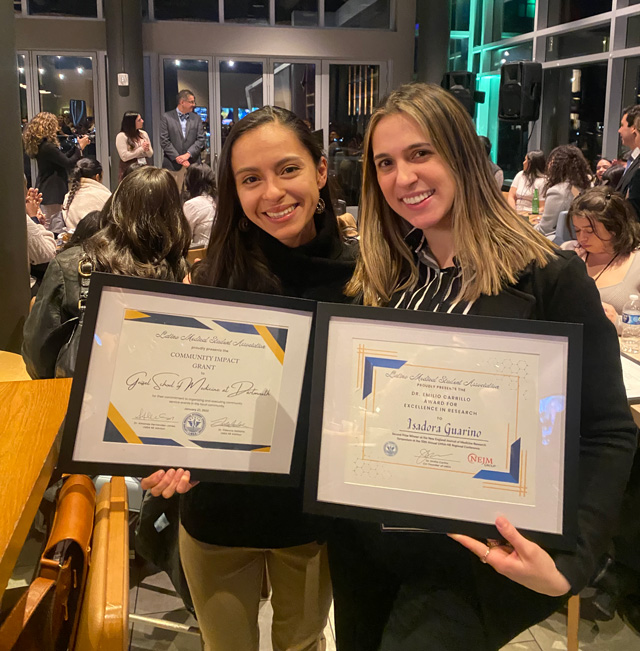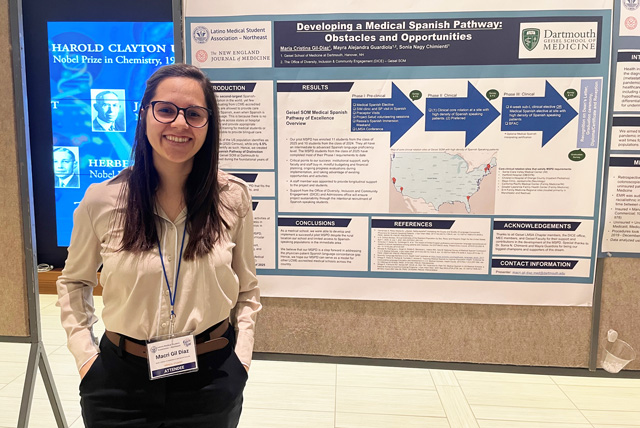Two Geisel School of Medicine students, Isadora Guarino ’24 and Paula Sofia Lara Mejia ’25, were recognized during the 50th Annual Latino Medical Student Association (LMSA) Northeast Regional Conference. LMSA supports and seeks to inspire a diverse and multicultural physician workforce capable of developing innovative solutions to healthcare access and leading the medical profession toward a more equitable and just future.
Lara Mejia, who is leading a project to create sustainable management of mental health resources for the migrant farm worker population in the New Hampshire and Vermont Upper Valley, received the LMSA Community Impact Grant to help fund SaludableMente—a project she began as a Schweitzer Fellow in 2022.

Farm workers with moderate to severe mental health concerns have difficulty accessing scarce mental healthcare resources because of a lack of Spanish-speaking healthcare providers. Lara Mejia says that while SaludableMente, which is part of Project Salud, cannot fix the cycle of larger systemic issues in this population—migrant farm workers work long and hard hours, live in isolated areas, and are far from their families—community-based solutions can provide infrastructure and connectivity that can improve farm workers mental health and resiliency.
Working closely with local mental healthcare providers and individual migrant farm workers in need of mental healthcare on a case-by-case basis, Lara Mejia hopes this intervention will help diminish worsening mental health in this population while continuing the work of Project Salud in creating a future where farm workers thrive.
“I am very grateful for this grant as it helps recognize the work we have done in our community,” she says. “We are really passionate about this project, and while passion is a key ingredient, we are working hard to build the infrastructure, so this continues beyond specific students’ time in the Upper Valley. I am hopeful that the LMSA Community Impact Grant encourages the Geisel community to continue this important work.”
Created in 2010 by Schweitzer Fellows and Geisel medical students Holly Schroeder MED ’13 and Karl Dietrich MED ’14, along with Vermont family physician Stephen Genereaux MED ’87, Project Salud provides comprehensive medical and dental care to migrant farm workers in the Upper Valley in a culturally and linguistically sensitive manner via mobile health clinics to improve their quality of life by dismantling healthcare inequities. Project Salud now serves more than100 migrant farm workers across 10 farms.
“Paula’s project to address mental health concerns in migrant farm workers is an essential part of improving health care access for a community that plays such an important role in local agriculture,” Schroeder, a pediatrician, specializing in adolescent medicine, says. “We are thrilled to see medical students like Paula expand Project Salud by continuing to identify and address new community needs,” adds Dietrich, who is the Inaugural Program Director of the Cheshire Medical Center Family Medicine Residency.
Guarino, who is spending this year pursuing a master’s degree in engineering, took second place in the Dr. Emilio Carrillo Award for Excellence in Research for best oral presentation.
Describing her work as a summer research fellow at Mayo Clinic, where she investigated the effects of manipulating repopulating cell fate for tissue growth, repair, and remodeling, Guarino talked about the critical need for tissue-engineered heart valves that are immunologically acceptable, unfixed, and pro-regenerative. Valvular heart disease is a major cause of morbidity and mortality worldwide and surgical valve repair and replacement is the standard of care using mechanical prosthetic or biologically derived valves. However, each of these approaches have limitations: mechanical valves require lifelong anticoagulation therapy to control thromboembolism, while bioprosthetic valves remain subject to a chronic immune response, resulting in structural valve deterioration and limited longevity.
“This award truly means a lot to me. I feel as though it is a nice culmination to highlight the work and effort that I have put forth during my time at Mayo Clinic working at the intersection between engineering and medicine,” Guarino says.

Also, during the conference, Macri Gil Diaz ’23, presented a poster on Geisel’s Medical Spanish Pathway to Excellence longitudinal curriculum implemented this spring. The four-year pathway prepares medical students interested in providing care for Spanish-speaking populations—upon completing the pathway, graduating students will be confident in their ability to communicate with their patients in clinical settings and receive certification in medical Spanish language proficiency.
Hosted this year by the Johns Hopkins University School of Medicine, the anniversary conference highlighted Latino innovation, service, and leadership in medicine by celebrating individuals who have pioneered a path forward for all Latinos in healthcare and in supporting the next generation of Latinx physicians as they work towards providing more just and equitable healthcare for their communities.